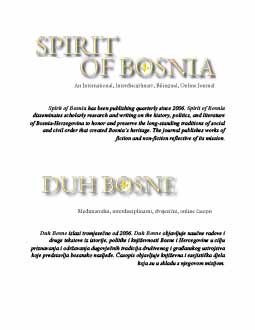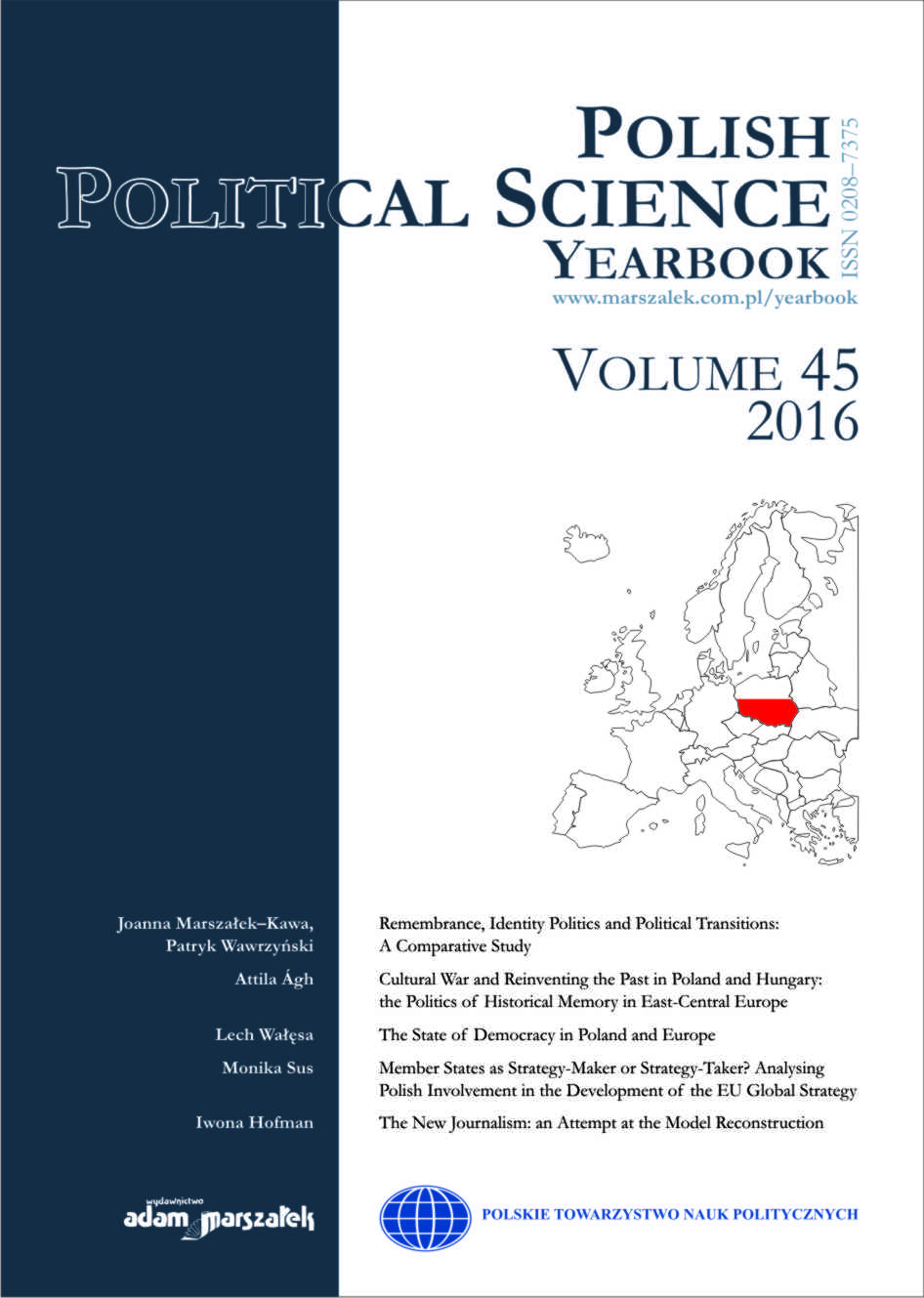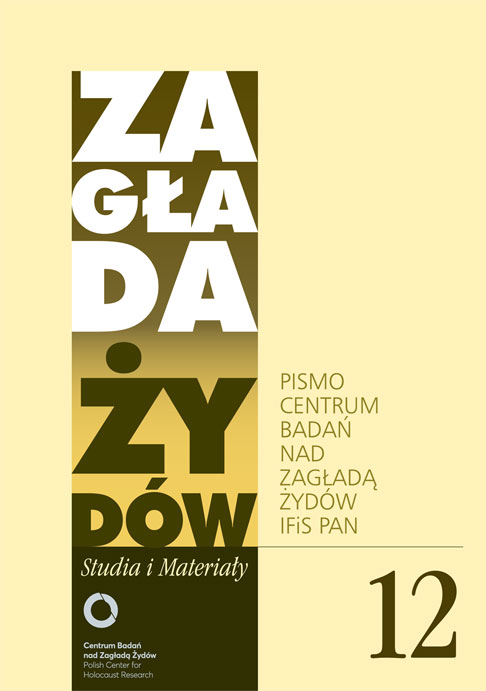
We kindly inform you that, as long as the subject affiliation of our 300.000+ articles is in progress, you might get unsufficient or no results on your third level or second level search. In this case, please broaden your search criteria.



As the U.S. presidential election hits high gear, the candidates and U.S. government won’t let the infiltrations earlier this year fade away.
More...
The article shows the contribution of the spiritual intelligentsia to the formation and development of justice on the territory of Ancient Russia. The analysis of legal sources indicates considerable influence of Byzantium on the formation of regulatory base and justice of Russia. Raised are the questions of judicial powers of the Old Russian episcopate in relation to judicial disputes of laymen and clergy. The empirical material is presented by quotes from the legal documents of Byzantium and Ancient Russia confirming theoretical views of the author.
More...
The article demonstrates how references to Nazi and Soviet past are perceived and evaluated by the European Court of Human Rights. Individual cases concerning Holocaust and Nazism, which the Court has examined so far, are compared here to judgments rendered with regard to Communist regime. The article proves that the Court treats more leniently state interference with freedom of expression when memory about Nazism and Holocaust is protected than when a post–Communist state wants to preserve a critical memory about the regime. The authors of the article agree with the attitude of the Court which offers a wide margin of appreciation to states restrictively treating references to Nazism and Holocaust, including comparisons to the Holocaust, Nazism or fascism used as rhetorical devices. At the same time they postulate that other totalitarian systems should be treated by the Court equally.
More...
This paper analyzes the main approaches to the institutional method of studying legal phenomena in Russian legal science. The attention is focused on the problem of understanding the essence of legal institution. It is established that treating laws and legal institutions as interchangeable concepts is currently an archaism in legal science, which impedes the development of the idea of institutions as the basic legal categories.
More...
The rules of the legislative (representative) body of state authority in the subjects of the Russian Federation form a relatively independent group of normative legal acts, the nature of which is controversial. The theory of normative legal acts is focused, as a rule, on problems concerning their development, practice, and implementation. The practice of constitutional (statutory) courts complements the scientific view of nature, content, and characteristics of parliamentary rules.
More...
The paper is devoted to the study of issues on definition of the legal capacity of the state as a participant of civil-law relations, an area that needs improvement of the legal regulation. The aim of the paper is to determine the legal capacity of the state with regard to the threetiered system of its involvement in civil relations, as well as to consider problems concerning the responsibility of officials for actions of the state and its bodies. The conclusion is made about the need to ensure accountability of officials for harm caused by the state.
More...
The paper analyzes the current legal doctrine of natural and entity persons in civil and family laws in terms of their comparative analysis and sectoral characteristics. Discussion on the suggestion to waive the mainly civil approach to definition of the legal and active capacity is encouraged. This led to the suggestion that the sectoral theoretical conclusions can be brought in line with the general theory of law. The modern scientific material on the theory of law is used. Innovative suggestions in this area of knowledge are presented. An attempt is made to extend particular suggestions to the area of family law. We introduce our own definition of such sectoral concepts as legal capacity and active capacity. The necessity of their determination based on a thorough analysis of research works of both Soviet and current periods in the development of legal thought is proved.
More...
The paper is devoted to the study of urgent problems which appear as courts apply the rules on responsibility for improper fulfillment of alimony obligations. In order to secure the judicial practice uniformity, it is suggested to improve the legal regulations on application of material sanctions for the delay or failure to fulfill alimony obligations.
More...
Adoption of suspensive regulations when introducing new penal sanctions is subjected to criticism. The legal status of persons sentenced to imprisonment and penal labor is considered from the point of legal comparativistics. Similarities are found between serving the imprisonment sentence as penal labor and in penal colonies. Therefore, it is suggested to introduce a new denomination – custodial restraint with compulsory assignment of the sentenced person to labor instead of penal labor.
More...
It is universally accepted that an arbitral award can be challenged if the arbitrator did comply with the agreement of the parties (cf. Art. V of New York Convention on the Recognition and Enforcement of Foreign Arbitral Awards of 1958). However, theory and practice do not always meet. Many jurisdictions seem to allow the arbitrator to deviate from such agreement without effect to the award. The article focuses on the question as to which extent the arbitrator is bound by the state/national law chosen by the parties or applicable but by virtue of international private law. Common wisdom has it that an arbitral award cannot be annulled or denied recognition because the arbitrator erred in the interpretation of the substantive law. Author accepts that in a motion to challenge an arbitral award the state court shall not act as some kind of court of appeal. Therefore, arbitrator must not apply the substantive law in the same way the courts of the respective country do, but he is obliged and the state court is competent to review, whether the award has been made in accordance with the agreement of the parties. To this end, the arbitration clause must be carefully interpreted to find out what the parties by choosing, e.g., Swiss law really meant: namely, “law” and not a paralegal regime like ex aequo et bono, as well as “Swiss” – and not German, English etc. Unless this is shown in the reasons of the award, it may be annulled or denied recognition for not being in accordance with the agreement of the parties.
More...
The paper considers the main problems of state-private partnership agreements and public-private partnership agreements as civil law contracts, as well as their inherent characteristics distinguishing them from other civil law contracts. The legal nature of partnership agreements, their material terms, as well as the main rights and obligations of the parties are revealed. The relevance of this research is determined by the fact that the Federal Law no. 224-FL “On sate-private partnership, public-private partnership in the Russian Federation and amendments to certain legislative acts of the Russian Federation” of July 13, 2015 entered into force on January 1, 2016. This federal law aims to create a legal environment for attraction of investment in the economy of the Russian Federation and increasing the quality of goods, works, and services, the availability of which is ensured by the state and local public authorities. The federal law determines the main principles of legal regulation of relations arising from formulation of the project of state-private and public-private partnership, as well as conclusion, execution, and termination of state-private and public-private partnership agreements, including the corresponding competences of state and local public authorities, establishes the security of rights and legal interests of the parties of state-private and public-private partnership agreements. Based on the results of the study, the conclusion is made that state-private and public-private partnership agreements are complex in nature. They can be regarded as mixed contracts that sometimes contain claims from unidentified sources.
More...
The Russian civil law and practice have undergone major changes aimed at improving the legal normalization of relations and the modernization of private legal practice in the spirit of the disposition method of regulation. The legal approach, according to which any rule that defines the rights and obligations of the parties to the contract should be interpreted by the court on the basis of its spirit and legislative regulation purposes, is conceptual for interpretation of the rules. It eliminates formalism in the law enforcement practice. To illustrate the essence of this approach, the authors refer to the analysis of the provisions of Article 452 of the Civil Code of the Russian Federation (the Civil Code), which allows to find out what kind of sense is put by the legislator in the requirement for pretrial settlement of the dispute on change (termination) of the contract, which turns out to be a mandatory step for bringing the case to court consideration. On the basis of interpretation and study of the judicial practice, attention is drawn to the fact that the provisions of Article 452 of the Civil Code should not be understood purely formally and are designed solely for the court to unsure that attempts to pretrial resolution of a legal conflict were made and are exhausted. This approach to interpretation of the provisions of Article 452 of the Civil Code is consistent with the objectives of legal regulation and does not create unnecessary obstacles to implementation of the rights of the bona fide participants of civil relations.
More...
The paper analyzes the procedural activity performed by the court of law within the stage of initiation of civil or administrative cases. As noted, it is impossible to reveal all grounds for rejecting adoption of the statement of claim or its return at the stage of case initiation. These grounds are as follows: final court decision on an identical claim; singing of the statement of claim by a person, who is not authorized to do so; sufficient mental capacity of the applicant. The fact of signature of the statement of claim by the applicant or authorized person can be found out only during the court session, which is not assumed by the stage of initiation of case proceedings. Furthermore, it is impossible to verify the final court decision which entered into force on an identical claim due to the absence of procedural mechanisms in the court for identification of these grounds. It is emphasized that the stage of case initiation should reflect the actual capacity of the court to verify the availability or absence of grounds for rejection or return of the statement of claim, which is the manifestation of the investigatory origin of court procedures at the stage of case initiation. At the same time, consideration of the issue on initiation of case proceedings and adoption of the relevant judgement in the absence of the person concerned, as well as revision of this judgement without notice of the persons involved in the case, violate to a certain degree the right of the claimant for judicial protection. The conclusion, therefore, is that the person concerned should be enabled to convey their position to the court, thereby implementing their right to be heard.
More...
Attention is paid in the paper to the need for studying and solving the urgent problems concerning implementation of the prejudicial institution in criminal proceedings based on the decisions of inter-branch legal processes from the point of new methodological, i.e., systemic and institutional positions. The problems associated with the essence and implementation of inter-branch prejudgment are considered. Their potential solving is discussed. In accordance with the aim of this research, the following tasks are set: 1) to reveal the essence of the prejudicial institution; 2) to specify its properties; 3) to find out the peculiarities of mutual influence produced by various legal proceedings based on the prejudgment of court decisions. The study of this kind is for the first time performed in line with the theory of legal institutionalism and the systemic and institutional method for analysis of legal phenomena. As a result, the author’s definition of the prejudicial institution is given. Its main properties are described. The forms of prejudgment of the legal relations during criminal proceedings are singled out. The following major properties of the prejudicial institution are identified: the availability of actual and nominal holders; the specificity in relations between trial participants regulated by legal norm; time of validity; transparency of the prejudicial rights of participants of various legal proceedings; the degree of formalization of the prejudicial institution and securement of prejudgment in the legal and regulatory frameworks; the use of the mechanism of direct control over compliance with the prejudicial norms. The differential parameters of interrelation between the institutional relations when proving the circumstances in different proceedings are shown. Prejudgment of the legal relations (criminal sentences) in civil, arbitration, and administrative legal proceedings, on the one hand, and in criminal legal proceedings, on the other hand, is analyzed. Attention is drawn to the need to establish an efficient mechanism of legal regulation of the prejudicial institution. The practical importance and value of the work lies in applicability of the results of this study during the process of judicial activity for recognizing the prejudgment of certain inter-branch judicial acts.
More...
The paper is devoted to some conceptual issues of reforming local self-government in the Russian Federation, which are incorporated both in the latest legislative regulation and in the decisions of the Constitutional Court of the Russian Federation. The relevance of the research is determined by the search for an optimum model of local self-government making it to be embedded in the system of public power that has been performed at the legislative level of Russia for many decades. The research is carried out with the purpose to identify problems in the legislative regulation of issues concerning the territorial organization of local self-government, as well as to elaborate a model that would be acceptable for arrangement of the relations between federal, regional, and local authorities. One of the key issues and important directions in the studied problem is expansion of the powers exercised by authorities in the constituent entities of the Russian Federation regarding regulation of the relations in the system of local self-government. The latter is important from the position of assessment of the constitutional regulations on the independence of local self-government, as well as the right of the population to independently determine the structure of the local government and the right of the federal and regional legislators to consolidate the general principles of organization of local self-government. The latest legislative innovations have introduced a number of changes in the model of differentiation of powers in the sphere of organization of local self-government. That allows to indicate a decisive role of the constituent entities of the Russian Federation in the matters concerning the order of organization of local self-government. Enhancing of the role of regional authorities is explained by the desire of the legislator to expand the influence of public authorities on organization of the local self-government system, thereby to legalize the actual and not always simple and clear relationship between the heads of local municipalities and the constituent entities of the Russian Federation. Among the revealed innovations, the key role in the search for an optimum model of organization of local self-government is given to decisions of the Constitutional Court of the Russian Federation. The authors of the paper analyze the recent decisions of the Constitutional Court of the Russian Federation in the sphere of local self-government. Attention is focused on the doctrinally important conclusions made by this judicial body for further reforming of the territorial pattern of local self-government. The conclusion is made about the need for extension of the legislative powers of the constituent entities of the Russian Federation that would expand the variability of legal regulation and would create a variety of tools to evaluate and select the most effective legal mechanisms for achieving the objectives of municipal government.
More...
The objective of the paper is the presentation of relationships between the notions of identity, image and reputation within the judiciary; the principles of shaping the image of the justice system; good practices of building a positive image used by courts; the level of maturity of courts covered by a pilot study when it comes to using a variety of actions enhancing the image; role and possibilities of inter-organisational networks in the transfer and homogenising good practices of building a positive image of courts. The basic research methods employed in the paper are: literature studies, empirical analysis based on available secondary research, as well as personally conducted empirical research for the purposed of the paper. Also, the case study method was adopted to better illustrate the implementation process of the good practice by the name of improving the general image of the court.
More...
Drawing on the example of the deportations of the Jews of Prużany to Auschwitz in January 1943, the article examines the efforts on part of the Bielefeld district court to establish that the organization of the transport of Jews from Bezirk Bialystok was a decentralized undertaking for which German local and regional occupation authorities were responsible. The regional departments of the German national railway system (Deutsche Reichsbahn) were in charge of the administrative coordination of the Sonderzüge. The article analyzes the examinations of two former employees of the special train unit of department 33 of the Reichsverkehrsdirektion Minsk under German occupation. During the so-called Białystok Trial (1966-1967) the Bielefeld jury court examined former Reichsbahn officials Hermann Kayser and Hans Wieck as witnesses. Having received an order by the KdS in Białystok they drew up the timetable and railway telegrams for the deportations of Jews from the train station of Oranczyce to Auschwitz. They were not brought to justice for their participation in the Holocaust.
More...
In November 2024, a unique four-volume publication titled "Popravení z politických důvodů v komunistickém Československu" was released, detailing the cases of individuals executed for political reasons during the communist era in Czechoslovakia. This extensive monograph, spanning nearly 4,000 pages, uses biographical entries as case studies to explore known and ambiguous instances of political executions, including those that straddle the line between political and criminal offenses. The publication, a collaborative effort led by Petr Mallota, involved contributions from thirty authors over fifteen years, drawing from a wide array of sources such as State Security investigation files, National Archive documents, and personal testimonies. The research revealed surprising findings about the political manipulation of criminal acts and the brutal nature of the regime's repressive measures. Notable cases include the execution of Milada Horáková and the controversial inclusion of war criminals mistakenly listed as political victims. The book also highlights the continuity between the second and third resistance movements and the significant role of workers and armed forces members among the executed. The meticulous documentation of these cases underscores the importance of remembering and honoring those who resisted the communist regime.
More...